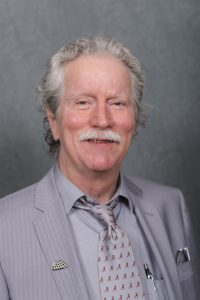
On a cold winter day, 7-year-old Kevin Corcoran laid across an air vent on the floor of his parents’ home.
He began to mimic the high-pitched, rapid thumping sounds of the curtains twisting and unfurling as the warm air shot from the vent. That day would mark the first of many “inventions” for Corcoran, who idolized his grandfather’s ability to make all sorts of “cool noises.”
“I actually invented the water bed,” Corcoran said. “My brother and I would fill the plastic bags inside the large cartons of milk and make ‘water pillows.’ Years later, someone else creates the waterbed.”
Though he wouldn’t receive credit for the waterbed, Corcoran’s inventive and entrepreneurial spirit runs concurrent with his professional career as both a lawyer and social work professor.
Inventions to improve social work
Corcoran, a professor of social work at The University of Alabama, has encouraged students at each of his academic appointments to think of practical, creative and innovative ways to impact the field of social work.
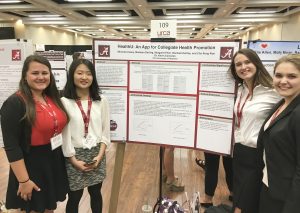
Some of his students at UA created a tote bag that had simple meal recipes printed on each side. The recipes were influenced by items available through the WIC program and could hold 40 pounds of food. The students made 200 bags and gave them away for free to food banks. Corcoran’s students also created the “Love Cub,” a teddy bear that has recordings of words of encouragement for children who are admitted to hospitals.
“I gave them a six-word assignment to ‘invent something that improves social work,’” Corcoran said. “The idea is that, if you can be creative over here, you can be creative over there. They all get so enthusiastic about their inventions. It enhances their sense of what they can do.”
Corcoran said social workers don’t often think of themselves as creative, but they begin to develop ideas for how to make broader impacts on the field while serving in field placements.
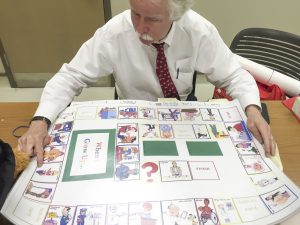
Gabrielle Franklin, a MSW student, was initially skeptical of the assignment. She didn’t know of anyone who’d taken Corcoran’s class, which was one of the first classes she would take after transferring from Tuskegee University last summer.
“When [Corcoran] told us about the assignment, I was intrigued and curious as to how we would actually go about it,” Franklin said.
Franklin teamed with four other social work students to conceptualize a mobile application to help connect people with substance abuse issues to resources in the Birmingham area, like AA meetings, shelters and churches that provide counseling services. The app also included a link to a web site called EasyRATs, a mental health assessment created by Corcoran.
“We wanted to create something that focused on decreasing recidivism,” Franklin said. “When we started researching, we found that substance abuse has a major part in recidivism, so we wanted to focus on the root of the problem.”
The next step for Franklin and her team is to partner with the third parties that offer services to fully integrate their information into the app and to market it to their clients. Then, they’ll need someone to build the app for various mobile platforms – an added expense that Corcoran has offered to fund. Corcoran said he offers financial backing to any team that wants to advance their idea.
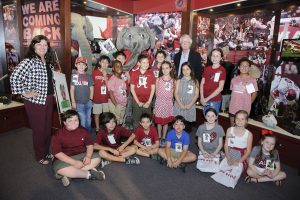
From innovation to funding
Corcoran plans to tie in the innovation components of his classes to a scholarship in the School of Social Work. The requirement for the $3,000 “Social Work Innovation Scholarship” has the same simple concept from his classes: invent something that improves the field of social work.
“It also has to have the word ‘Alabama’ in it,” Corcoran said. “And if the invention makes you some money, remember your alma mater.”
Corcoran plans to fund the scholarship through a collaborative with 7-, 8- and 9-year-olds at The Capitol School in Tuscaloosa. The Capitol School students created a book titled, “Big Al, Big Al, What Do You See?,” a picture book inspired by the painted tissue paper collages in “Brown Bear, Brown Bear, What Do You See?” and “The Very Hungry Caterpillar.” The students began a written project as an exercise on adjectives and illustrated the book after Corcoran contacted Missy Richey, primary academic teacher at the school.
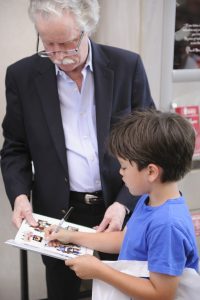
Corcoran offered to pay to publish the book and split the haul between Capitol School and the School of Social Work, where Corcoran would distribute the book and accept donations to help fund the innovation scholarship. The Capitol School plans to sell its copies of the book.
“I’d always wanted to do a book in this style,” Richey said, “so this is like a dream come true for me. The kids are beyond excited – they’re published.
“Kevin impressed me as an entrepreneur. I thought he was for real, but I didn’t know if I’d be able to follow through and get it there.”
To date, more than 2,500 copies of the book have been published. Corcoran’s goal is to see the scholarship endowed to reach $25,000 in the next three years and allow for a paid internship at The Capitol School.
Similarly, Corcoran also plans to fund the scholarship through “Little Al, the Alabama cheering glove,” a gray glove painted and embroidered to look like an elephant that has a button to make elephant sounds. Corcoran said he conceptualized the spirit glove shortly after arriving at UA and discovering that, unlike other universities, UA didn’t have recognized hand gestures for fans to use at sporting events.
Contact
David Miller, UA Media Relations, 205/348-0825, david.c.miller@ua.edu
Source
Dr. Kevin Corcoran, professor, School of Social Work, kjcorcoran1@bama.ua.edu
